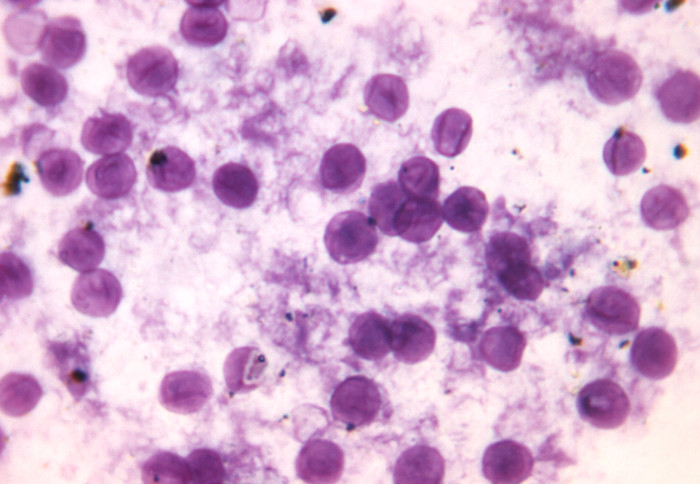Imperial partners in new research group on HIV-associated fungal infections
by Lou Lee

Pneumocystis pneumonia
A major new research group aims to improve the diagnosis and treatment of serious fungal infections in HIV/AIDS.
Researchers from Imperial College London will join IMPRINT, a multidisciplinary team of academics, clinical and public health leaders, as well as non-governmental organisations (NGOs), to combat common HIV-associated fungal infections.
Serious fungal infections are a major threat to global public health, affecting over 150 million people and accounting for up to 1.5 million deaths per year. Because HIV weakens the immune system, many people living with the virus are disproportionately affected by these ‘opportunistic’ fungal infections. Despite this, studies are chronically underfunded, receiving less than 1.5 per cent of all infectious disease research funding.
With support from a £3 million grant from the National Institute of Health and Care Research (NIHR), IMPRINT (which stands for International Mycoses Prevention, Research, Implementation, Networks and Training) will aim to combat four major HIV-associated fungal infections; cryptococcal meningitis, histoplasmosis, Pneumocystis pneumonia (PCP) and talaromycosis. These infections are responsible for over 20 per cent of all AIDS-related deaths worldwide and have been recognised by WHO as priority diseases in 2022.
The group will focus on six key objectives regarding treatment, prevention, health economics, diagnostics, training and community engagement between 2022 and 2026. Efforts will be targeted towards underserved populations in Africa (Democratic Republic of Congo, Mozambique and Guinea) and in South East Asia (Vietnam).
Researchers from Imperial will be specifically involved in initiating a programme of earlier-stage, laboratory-based work on PCP. Led by Dr Rachel Lai from the Department of Infectious Disease, and in close collaboration with the University of Cape Town and Tulane University, the Imperial group will analyse the biological samples of patients to develop and test novel diagnostic tests for PCP.
Dr Lai said: “PCP is one of the most common fungal infections in HIV patients, but it is notoriously difficult to diagnose and treat, constituting a major barrier to reducing PCP deaths. Laboratory propagation is also challenging, making it one of the most understudied infections.
“This NIHR grant will allow us to conduct highly relevant studies on infections that cause mortality in over 20 per cent of patients with advanced HIV. Through close collaboration, we will comprehensively characterise host-pathogen interaction in PCP infection and the data will provide important insights on future tests and treatments.”
Led by the London School of Hygiene & Tropical Medicine, IMPRINT will gather insights from qualitative research, with guidance from a steering committee and a community advisory board. The group also plan to liaise with national, regional, and international bodies such as UNITAID, WHO and Africa CDC in order to effectively scale up the results and impact of its work.
Dr David Lawrence, a group collaborator and clinical research physician at LSHTM commented: “We look forward to bringing together leading experts from a wide range of research disciplines and working alongside communities of people living with HIV to answer the urgent questions in this field. The broad scope of IMPRINT and our ambitious programme of work provide us with a real opportunity to generate the findings needed to reduce mortality from these deadly infections.”
Article text (excluding photos or graphics) © Imperial College London.
Photos and graphics subject to third party copyright used with permission or © Imperial College London.
Reporter
Lou Lee
Faculty of Medicine Centre